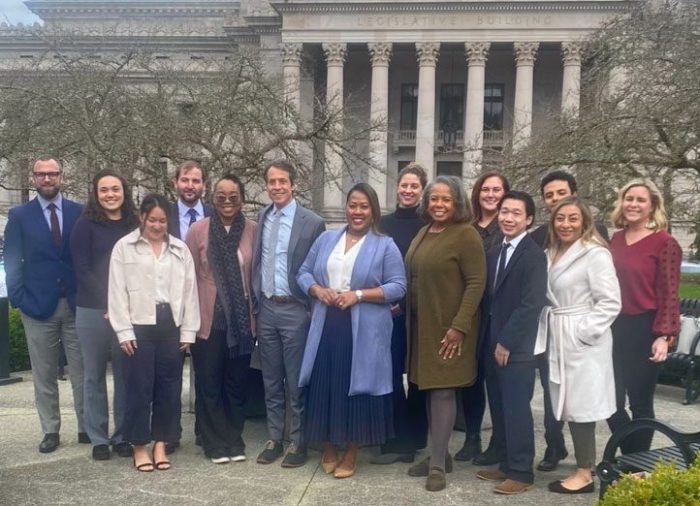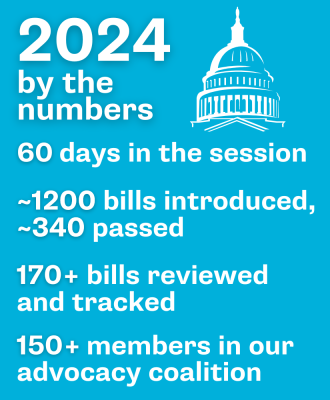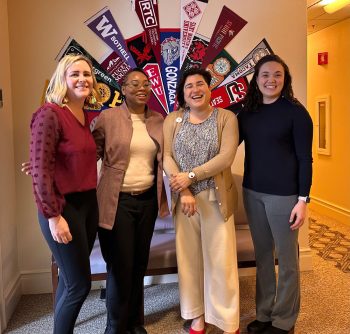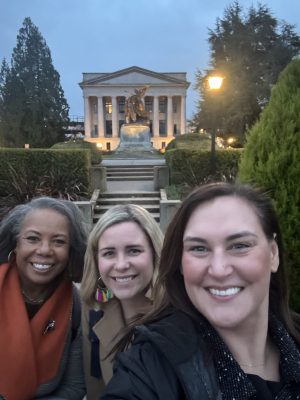2024 Legislative session: small changes, big impact


To paraphrase Ferris Bueller: “The legislative session moves pretty fast. If you don’t stop and look around every once in a while, you could miss it.”
The 2024 session was no exception. In just 60 days, we saw investments in early learning (HB 2195 and HB 2124), Indigenous language revitalization (HB 1228), expansions to dual credit programming (HB 1146), and increased financial aid access for students (SB 5904 and HB 2214).
For Jayme Shoun, Washington STEM’s Policy Director, these shorter sessions allow policymakers to build on the previous session’s successes: “In a supplemental year, there’s a lot to accomplish within 60 days. We know that what may seem like incremental changes, can together, make a big impact.”
Strengthening the foundations…literally
Access to quality child care is an important foundation for future STEM learning. That’s why we advocated for legislation to expand the Working Connections Child Care (WCCC) to child care workers and families in therapeutic court, among others. As we continue to partner with the Department of Children, Youth, and Families on our Early Learning dashboards, we’ll be measuring the impact of statewide investments in child care.
The legislature invested nearly $27 million into a pre-existing grant and loan program for child care facility renovations. This means that child care providers for two state subsidy programs, Early Childhood Education and Assistance Program (ECEAP) and WCCC, can improve their facilities, a necessary step to increase capacity and serve more families. Community and technical colleges, federally recognized tribes, educational service districts, local governments, and religious organizations that provide child care are also eligible to access these funds.
Revitalizing language = supporting Native students
This session, we continued our partnership with the Office of Native Education (ONE), the liaison between OSPI and sovereign tribes and Native families, by supporting legislation to strengthen pre-existing dual language programs, with a special focus on tribal languages.
“We know that children develop holistically in the context of their families and communities,” Jayme says. “Supporting access to tribal language learning not only strengthens Native students’ cultural and tribal identity – it can also support those students’ confidence in and readiness for postsecondary education.”

It’s official – the kids love dual credit
Following last year’s elimination of fees for College in the High School, enrollment in the dual credit program increased dramatically. There was just one problem – participating colleges and trade schools were operating on funding based on the previous year’s lower enrollment. Legislators adjusted the budget to ensure that these programs continue to thrive, and that students get equitable access to dual credit.
Of course, students can only reach for dual credit opportunities if they know those pathways exist. New legislation ensures that schools inform students and families about dual credit programs, as well as financial assistance available to reduce dual credit course and exam costs.
“We know that students rely largely on teaching staff and peers to share information about postsecondary pathways,” Jayme says. “Students want that information early and often and within their school day – whether it’s financial aid education starting in 9th grade or regular class periods dedicated to learning about career pathways.”

Helping students access financial aid
A handful of policies passed during the 2024 session are also helping more students access the nation’s most generous financial aid program right here in Washington.
A new law extends state financial aid eligibility from five years to six years . That extra year makes a big difference – the Washington Student Achievement Council (WASAC) estimates that roughly 6,800 students currently using aid from Washington College Grant, College Bound, or Passport to College are within one year of losing access to that aid – but all are on track to graduate.
“It’s likely students who are opting in to high-demand technical STEM degrees that require more time to complete,” says Jayme. “This bill is going to help students who are working and have families to take care of.”
This new law also removes the maximum age requirement for the Passport to College program, a financial aid program supporting homeless students and students who have been in the foster care system.
Another law passed this session automatically qualifies students on the food assistance program SNAP for the maximum Washington College Grant award, the program that provides income-eligible students with money for certificate programs, job training or college tuition. The College Promise Coalition estimates that this will give 30,000 more students access to the aid that results first in a postsecondary credential and then in a high-demand career.
Read an in-depth recap of the 2024 legislative session.